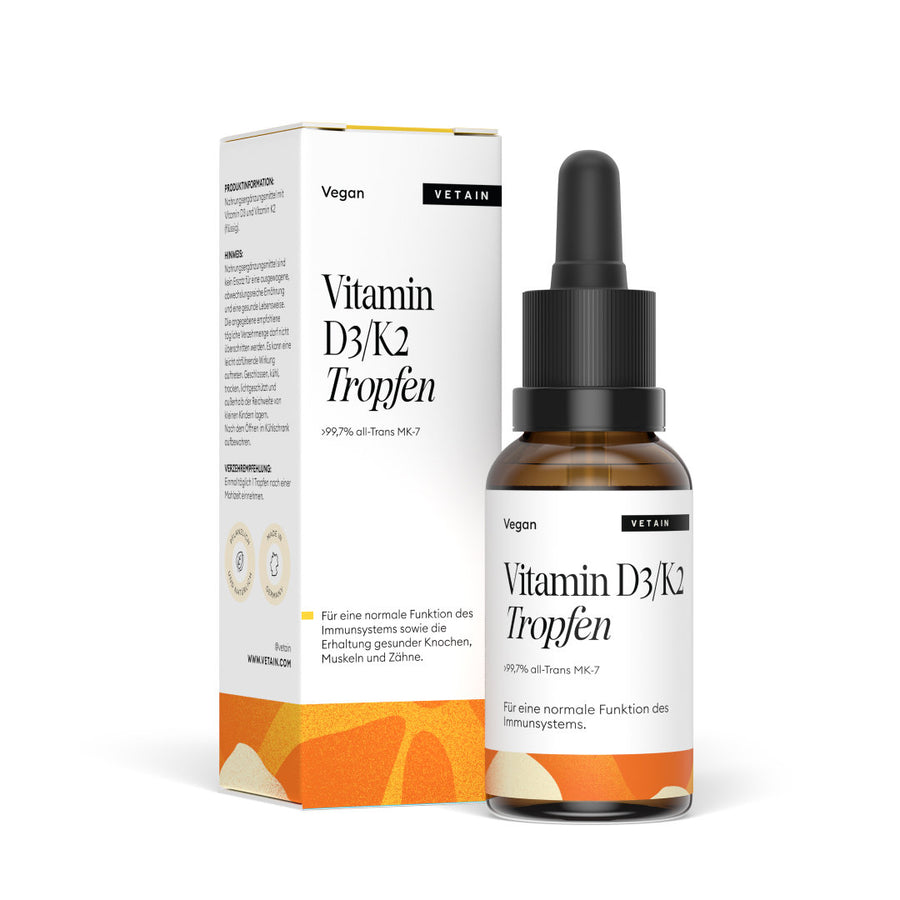Pregnancy is a special and beautiful time. At the same time, there are suddenly a thousand things to think about.
One of them: supplements. Your body is now responsible for nourishing two lives – and sometimes, a balanced diet just isn’t enough. That’s when supplements come in.
But which supplements should you take during pregnancy to really support your health – and your baby’s? And how do you find the right products for your personal needs? We’ll break it all down for you: what your body really needs and how to find the best supplements for pregnancy.
Quick Facts: Which Supplements Should You Take During Pregnancy?
-
Supplements during pregnancy help supply both you and your baby with essential vitamins and minerals.
-
Folic acid and iodine are generally recommended for all women, while other supplements depend on individual needs.
-
Vegetarians and vegans in particular need to pay close attention to getting enough essential nutrients.
Nutrient Needs During Pregnancy
Your body’s nutrient requirements change throughout pregnancy. While a healthy, balanced diet can often cover the increased demand, some nutrients are harder to get through food alone.
So let’s get started: Which supplements should you take during pregnancy?
Overview: Which Supplements Are Recommended During Pregnancy?
Let’s take a closer look at which supplements are recommended during pregnancy and who might benefit from them.
Important note: All information in this article refers to healthy women without specific medical conditions or complications during pregnancy. This article is not a substitute for medical advice.
Which supplements are generally recommended during pregnancy?
Folic Acid / Folate
- Why it matters: Folate supports blood formation and fetal growth, and plays a key role in preventing complications like neural tube defects.
- Supplementation: Recommended for all women.
- When & how: Start supplementing at least 4 weeks before conception and continue throughout the first trimester. Recommended dose: 400 μg daily.
If you started later, don’t worry: the dosage can simply be doubled temporarily to compensate for the delay.
You can also take other bioavailable forms of folate in appropriate doses. - Food sources: Leafy greens, whole grains, and legumes like lentils are great folate-rich foods to enjoy often!
Iodine
- Why it matters: Iodine is essential for your baby’s healthy development. A deficiency can lead to serious, long-term issues.
- Supplementation: Recommended for all women.
If you have thyroid issues, consult your doctor before taking iodine. - When & how: 100–150 μg of iodine per day, throughout pregnancy.
- Food sources: Iodized salt, dairy products, and fish.
Warning: Algae are sometimes recommended for iodine, but caution is needed during pregnancy – iodine levels can be excessively high and the algae may be contaminated.
Next up: Which Supplements Are Recommended During Pregnancy for Vegetarians and Vegans?
Omega-3 Fatty Acids
- Why it matters: Omega-3s are essential for the development of your baby’s brain and eyes.
- Supplementation: Recommended for anyone who doesn’t eat fish at least 1–2 times a week.
- When & how: Supplement with 200 mg DHA (a type of omega-3) daily, in capsule or oil form.
- Food sources: If you don’t take supplements, aim to eat fatty sea fish like salmon, herring, or mackerel 1–2 times per week.
Vitamin B12
- Why it matters: Vital for the development of your baby’s nervous system and brain.
- Supplementation: Recommended for all women who don’t meet the daily requirement – especially common in vegetarian and vegan diets.
- When & how: Dosage should be tailored individually with guidance from a doctor or certified nutritionist.
- Food sources: Meat, fish, and dairy are key sources. Plant-based foods contain little to no vitamin B12.
Zinc
- Why it matters: Zinc supports numerous processes, including cell division and the development of your baby’s immune system.
- Supplementation: Recommended for women who fall short of the daily requirement – again, often relevant in vegetarian and vegan diets.
- When & how: Dosage should be individualized with medical or nutritional advice.
- Food sources: Zinc is found in fish, cheese, whole grains, meat, nuts, and legumes.
Calcium
- Why it matters: Calcium, especially in combination with vitamin D, is essential for strong bones.
- Supplementation: Recommended for women who don’t get enough through their diet, particularly in the second and third trimester.
- When & how: As advised by a doctor or nutritionist.
- Food sources: Dairy products, leafy green vegetables, nuts, and fish are rich in calcium.
Other potentially important supplements during pregnancy:
Iron
- Why it matters: Iron deficiency is common during pregnancy and can increase the risk of complications such as preterm birth.
- Supplementation: Only recommended when a deficiency is diagnosed by a healthcare professional.
- When & how: As prescribed by a doctor or nutritionist.
- Food sources: Meat, fish, legumes, and nuts. To boost absorption of plant-based iron, combine with vitamin C-rich foods like bell peppers.
Vitamin D
- Why it matters: Known as the “bone vitamin,” it helps support healthy bones for both you and your baby.
- Supplementation: Especially recommended in the winter months or if you don’t get regular sun exposure.
- When & how: 20 micrograms (800 IU) daily.
- Food sources: Your body produces vitamin D naturally when exposed to sunlight – it’s not primarily obtained through food.
That covers the most important vitamins and minerals!
Keep in mind: depending on your individual situation, other nutrients like magnesium or vitamin C may also be helpful. A personal consultation with a professional is always the best option.
Vegetarian and Vegan Diets During Pregnancy
Are you vegetarian or vegan? Then you already know that some additional considerations apply when it comes to supplements during pregnancy. We strongly recommend a consultation with a qualified nutritionist. This ensures that you and your baby get all the nutrients you need – in the right amounts.
Pro tip: If you’re planning a pregnancy or have just found out you’re expecting, it’s smart to test for nutrient deficiencies early. That way, any issues can be addressed quickly and effectively.
Even if you know which supplements are generally important, the selection can still feel overwhelming. So many brands, so many promises. Don’t worry – we’re here to help you cut through the noise and find the products that are right for you.
Find Your Perfect Supplement
- Understand What You Really Need
Find out which vitamins and minerals are relevant to your specific needs.
Important: Taking a bunch of random supplements "just in case" is not only unnecessary – it can even be harmful. - Combo Supplements or Individual Nutrients?
There are multivitamin formulas specifically designed for pregnancy (sometimes tailored by trimester). But they’re not mandatory. You can also take nutrients individually. The advantage? You can tailor your intake to your exact needs. - Compare Products Before You Buy
Browse online, read reviews, and take your time. For more tips on choosing high-quality supplements and reputable brands, check out our article: “What Are Supplements, Really?”
Conclusion
Now you know everything essential about which supplements you should take during pregnancy. One final tip:
Check with your health insurance provider – some will reimburse or cover the costs of certain prenatal supplements.
By the way: vitamins and minerals remain important even after pregnancy!
Which supplements do you take during pregnancy? We’d love to hear about your experience – share your favorites with us!
FAQ (Frequently Asked Questions)
Why are supplements important during pregnancy?
Because your nutrient needs increase – and diet alone may not always meet them. Supplements help ensure both you and your baby are properly nourished.
Which supplements are recommended during pregnancy?
Folic acid, vitamin D, iodine, and omega-3s are often key. Which ones are right for you depends on your individual needs.
Are there any vitamins to avoid during pregnancy?
All vitamins are important – but more isn’t always better. Avoid unnecessary supplements and stick to those recommended for you.
Are supplements a must during pregnancy?
It’s strongly recommended to take certain nutrients to best support your baby’s development and your own health. You’ll find all the details in our guide above.
Sources
- DGE (2020). Einnahme von Nahrungsergänzungsmitteln in Schwangerschaft. https://www.dge.de/
presse/meldungen/2020/
einnahme-von-nahrungsergaenzungsmitteln
-in-schwangerschaft/ - DGE (2018) Handlungsempfehlungen - Ernährung in der Schwangerschaft. https://www.dge.de/gesunde-ernaehrung/
gezielte-ernaehrung/ernaehrung-in-
schwangerschaft-und-stillzeit/
handlungsempfehlungen-ernaehrung
-in-der-schwangerschaft/ - Netzwerk Gesund ins Leben (2024). Folsäure: wichtig vor und während der Schwangerschaft. Volle Speicher für eine gesunde embryonale Entwicklung. https://www.gesund-ins-leben.de/
netzwerk-gesund-ins-leben/aktuelle
-meldungen/meldungen-2024/
folsaeure-wichtig-vor-und-waehrend
-der-schwangerschaft/ - Netzwerk Gesund ins Leben (2018). Weitere Supplemente. Handlungsempfehlungen. https://www.gesund-ins-leben.de
/fuer-fachkreise/familien-vor-und-
in-der-schwangerschaft/
handlungsempfehlungen/supplemente/
weitere-supplemente/
About the Author
Melanie Seyfarth is a certified nutritionist (B.Sc.), specialized in supplements and expert in vegetarian and vegan nutrition. Since 2018, she’s been working in the fields of nutrition and health science. In this blog, she shares her insights on nutrition, sports, and lifestyle – and tasty recipes to try at home! Her articles are based on current research, real-life experience, and the mission to make complex topics easy to understand and inspiring to read.
Questions? Drop me a message – I’d love to hear from you! :)


















 8 Min
8 Min
 Zuletzt aktualisiert am 18.06.2025
Zuletzt aktualisiert am 18.06.2025




